#Supplements to Reduce Body Fat
Explore tagged Tumblr posts
Text
Benefits of Weight Loss Capsules
#Weight Loss Capsules#Supplements for Fast Weight Loss#Best Weight Loss Capsules#Natural Supplements for Weight Loss#Thermogenic Capsules#Weight Loss with Supplements#Supplementation Tips for Weight Loss#Calorie Burning Capsules#How the Weight Loss Capsule Works#Weight loss without sacrifices#Supplements to Speed Up Metabolism#Weight Management Capsules#Effectiveness of Weight Loss Supplements#How to Choose Weight Loss Capsules#Supplements to Reduce Body Fat
0 notes
Text
#united states#usa#Belly Fat Burner – Top Natural Ways to Slim Your Waist#Best Belly Fat Burner Pills – Top Picks for Fast Results#Best Fat Burner Supplement – Burn Fat & Boost Energy#best rated fat burner supplement#best way losing belly fat#burn fat burners#fast belly fat loss#fastest way to lose belly fat fast#fat burning#fat burning supplements#fat reduce supplement#good fat burner supplement#how can i lose belly fat fast#how do i reduce body fat#how do you lose fat#how reduce belly fat#how to belly fat loss#how to burn body fat#how to lose belly fat fast#how to lose fat#quickest way to lose belly fat
2 notes
·
View notes
Text
youtube
LIPOZEM Is the Natural Metabolism Boost You've Been Missing! REVIEW
#turmeric hack#Lipozem#Lipozem fat burning formula#natural metabolism booster#reduce body fat naturally#herbal supplement for fat loss#Lipozem appetite control#belly fat reduction pills#energy-boosting diet pills#advanced slimming support#all-natural weight control#plant-based fat burner#diet-friendly supplement#body sculpting support#Lipozem fat reduction aid#non-stimulant fat burner#support for healthy slimming#Lipozem energy and metabolism#balanced fat loss solution#reduce cravings with Lipozem#dietary supplement for fat reduction#metabolic support supplement#healthy body slimming aid#natural fat loss journey#body shaping and slimming#Youtube
1 note
·
View note
Text
Shedding Pounds and Building Confidence: My Experience with Lean Flux Weight Loss Supplement
For years, I struggled with maintaining a healthy weight. I tried countless diets, exercise routines, and even fad cleanses, but nothing seemed to stick. The frustration was constant, and it started to affect my confidence and overall well-being.

Click Here View Price Deal and Offer
A Shift in Approach: Discovering Lean Flux
Then, I stumbled upon Lean Flux Weight Loss Supplement. Initially, I was sceptical, having been disappointed by so many other weight loss products. However, the concept of targeting G-Flux, a metabolic process that supposedly aids in building muscle and burning fat simultaneously, intrigued me. After researching the science behind G-Flux and reading positive reviews from other users, I decided to give Lean Flux a try.
First Impressions: Easy Integration and No Side Effects
Lean Flux comes in convenient capsule form, making it simple to integrate into my daily routine. The recommended dosage is two capsules a day, one in the morning and another in the afternoon. I found them easy to swallow, and thankfully, I experienced no unpleasant side effects throughout my usage.
Combining Lean Flux with a Healthy Lifestyle
It's important to note that I didn't rely solely on Lean Flux for weight loss. I adopted a more mindful approach to eating, focusing on whole foods and portion control. I also incorporated regular exercise into my schedule, starting with brisk walks and gradually progressing to light weight training. Lean Flux, I believe, played a crucial role in supporting these lifestyle changes.
Experiencing the Results: Weight Loss and Muscle Gain
Within the first few weeks of using Lean Flux alongside my new diet and exercise routine, I started noticing a difference. The stubborn weight that clung to me for years began to shed. But more importantly, I felt a shift in my body composition. I wasn't just losing weight; I was gaining muscle definition. My clothes started to fit looser, and I had more energy throughout the day.
Improved Performance and Confidence Boost
The newfound strength I gained from building muscle had a positive impact on my workouts. I could lift heavier weights, perform exercises with better form, and push myself further. This translated into a newfound sense of accomplishment and a significant boost in my confidence. I felt stronger, both physically and mentally.
Sustainable Weight Management: Lean Flux as a Long-Term Partner
It's been several months since I started using Lean Flux, and the results have been sustainable. I've managed to maintain a healthy weight without feeling deprived or constantly battling cravings. Lean Flux, for me, has become a long-term partner in my weight management journey. It's a helpful tool that complements my healthy lifestyle choices.
Beyond Weight Loss: A Holistic Approach to Wellbeing
Lean Flux has offered me more than just weight loss. It's helped me develop a healthier relationship with food and exercise. I'm now more mindful of what I put into my body and prioritize activities that make me feel good. This newfound focus on overall well-being has had a positive ripple effect on all aspects of my life.
Would I Recommend Lean Flux? Absolutely!
If you're struggling to lose weight, build muscle, or simply want to support your overall health journey, I highly recommend giving Lean Flux a try. Remember, it's not a magic bullet, but it can be a powerful tool when combined with a healthy diet and exercise routine. Just like it did for me, Lean Flux might be the missing piece you need to achieve your weight loss and fitness goals.
Click Here View Price Deal and Offer
Disclaimer: It's important to consult with your doctor before starting any new supplement, especially if you have any underlying health conditions.
#reduce weight#foods that make you lose weight#healthy eating for weight loss#healthy foods to lose weight#fat burning diet#safe weight loss#diet and weight loss#fat weight loss#low calorie foods for weight loss#diet to reduce body fat#unexplained weight loss#reduce body fat#high fat diet for weight loss#no exercise weight loss#belly fat burning exercise#Best exercice to burn fats#loss fat#tummy fat#sudden weight loss#weight loss found#eating to lose belly fat#increase weight loss#belly fat reduce#good weight loss diet#belly fat loss exercise#best way to lose weight#Best healthy weight loss dietary supplement#Best healthy weight loss dietary supplements#natural remedies to increase weight loss#natural ways to gain weight loss
0 notes
Text
🌸🌿skinny lifestyle - balanced mind🌿🌸
~Being skinny is a lifestyle, not a challenge. It won’t come naturally and working hard is essential, so here are daily habits to build and to stay disciplined~
Your motivation WILL fade at some point. That’s when discipline and habits come in and you keep you in line.


1. 10k steps a day
It’s such a peaceful and efficient habit to start your day.
It helps you to stay lean, tone your body and burn some calories. Walking is low-stress, aids digestion and reduces bloating.
I love getting my steps in first thing in the morning. If that’s not possible just break it into chunks - morning, lunch break, evening walks or just whenever fits you💗



2. portion control > restriction
Labeling food as good and bad is so exhausting. The more you restrict yourself the more you tend to break your set up rules and binge.
Eat what you enjoy, just not excessively. Stay within your calories. Plan your meals.
You can use smaller plates, chew slowly, drink inbetween/before/after and avoid mindless eating in front of screens.
3. Gut Health Basic
I will die on this hill. Your gut health affects everything. Your whole body. Digestion, skin, energy and mood.
Healing your gut is essential and can you help drop weight.
Include probiotic foods: yogurt, kefir, kimchi, sauerkraut
Add prebiotics: oats, bananas, garlic, onions
Stay hydrated and reduce ultra-processed food, track what causes bloating or discomfort - everyone’s gut is different.


4. extra secret - blood sugar
Keeping my blood sugar level balanced helped me loose the last few pounds.
Eating high-sugar or fast-digesting carbs spikes your blood glucose and your insulin rushes in. Your blood sugar crashes and you will be hit with cravings, fatigue and irritability.
Stable blood sugar = fewer cravings, more energy.
When you eat balanced meals and and glucose enters your bloodstream slowly, your insulin stays in check.
= you stay full longer, crave less and burn fat more efficiently
Eating in the right order can help achieve that (first fiber, then protein/fat, then carbs)
~~Also, my recommendation would be Berberine !!
It’s a supplement working as a natural insulin-sensitizer and helps with glucose control. You’ll feel more energetic and can loose weight easily by burning fat more efficiently
~ You don’t need to cut carbs — you need to control how your body processes them.
It’s not “eat less” — it’s eat smarter ~
💗💗💗💗
#clean girl#wonyoungism#healthy habits#positive mindset#discipline#habits#pilates princess#pilates#work hard#workout#beauty#healthy mindset#clean mind#clean life#pilates aesthetic#working out#matcha#matcha girl#pink pilates princess#pink pilates girl#green tea#girls blog#girls girls girls#becoming the best version of yourself#best version of yourself#becoming her#becoming that girl#that girl#her#self love
83 notes
·
View notes
Text

Dolly's guide to glow this summer ✨🐬

visualize 💭
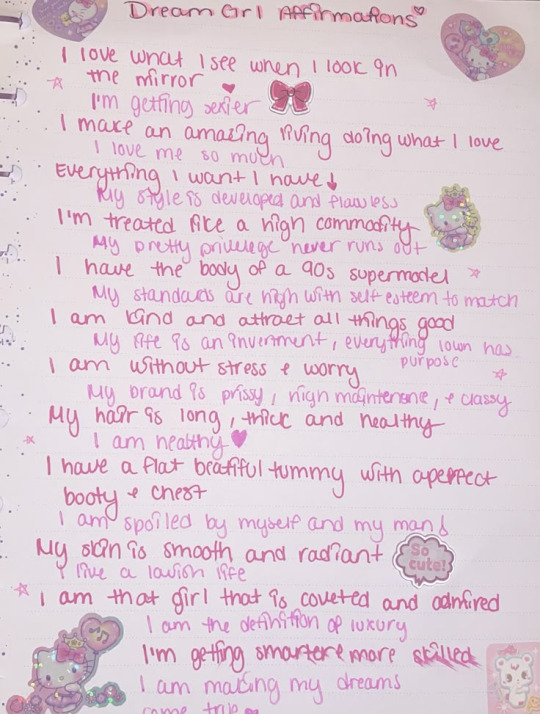



We all have that dream version of ourselves living in our heads, but with school and work, it can be tough to actually bring her to life. Now that classes are wrapping up and summer’s right around the corner, it’s the perfect time to start becoming her 🎀
Pinterest and Canva are amazing tools when it comes to figuring out your vibe. When you’re scrolling through Pinterest, don’t just save the first cute thing you see. Instead, ask yourself things like: “What would she wear?” “How does her hair look?” “What’s her everyday makeup?” Thinking this way helps you build a clear, consistent aesthetic to aim for.
For the next part, grab that cute notebook you’ve been saving because now’s the time to finally use it. Grab a pen in your fave color and start by answering these:
How does she talk?
What are her core values?
What’s a day in her life like?
move move move 🛼




The fastest way to bring out your inner glow is by moving your body. When you move, you increase blood flow and sweat, which helps flush out toxins and improve circulation. This, in turn, reduces inflammation and gives you that radiant glow🌟
One of the best things about summer is that there are so many fun ways to get active—it’s easier to sweat and feel good. Whether it’s a 30-minute walk or a 1-hour gym session, simply moving your body is already a win. Below, I’ll list some cute and easy ways to get moving:
Hot girl walks🌸 – Put on a cute outfit, turn on your fave playlist, and stroll around your local park or neighborhood.
Incline walking on the treadmill – A great alternative if you’d rather stay out of the sun but still want the benefits.
At-home Pilates & workouts – Throw on a cute set and follow a YouTube tutorial (just make sure the instructor is certified). Below are some of my fave channels!!
https://www.youtube.com/@DaisyKeech
https://www.youtube.com/@MadeleineAbeid/videos
https://www.youtube.com/@MoveWithNicole
https://www.youtube.com/@LillySabri
nourishment 🥒




The key to keeping that inner glow shining really comes down to your diet. When you regularly eat ultra-processed foods and lots of sugar, your body will show it, whether you want it to or not. This can lead to persistent low mood, continuous breakouts, and even premature aging. To fight back, focus on eating a diet full of fruits, veggies, and healthy fats. ✨
Here are a few tips to help glow from the inside out:
Struggle with getting in fruits & veggies? Try making a smoothie or looking into supplements—but always talk to your doctor first so you’re not taking anything unnecessary or harmful.
Add collagen & omega-3-rich foods like bone broth, chicken skin, salmon, and citrus fruits. These support skin health and boost elasticity.
Green tea + kombucha = goddess glow🌟 They’re packed with powerful antioxidants that help reduce inflammation, protect your cells, support gut health, and just overall benefit your health.
The (not so) secret to keeping your skin glowy and juicy is hydration!!! You need to stay hydrated both inside and out to get that natural radiance. When your body is well-hydrated, your circulation improves, more nutrients are delivered to your skin and cells, and toxins get flushed out. Below are some ways to stay hydrated:
Eat more water-rich fruits and veggies like strawberries, watermelon, cucumber, cantaloupe, lettuce, and spinach.
DRINK YOUR WATER!!!💦 If you struggle with plain water, try adding the mentioned fruits and veggies for a light, refreshing flavor (cucumber & strawberries are my faves) You can also use electrolyte powders, my top rec is the one from Ultima.
Alternatives If I’m not in the mood for water, I’ll also go for coconut water, tea, or 100% fruit juice (make sure it’s not from concentrate!).

skin 🧖♀️




When it comes to soft, shiny skin, exfoliation + hydration is the ultimate duo (with consistency of course) I like to focus on hydration during the day and exfoliation at night, since your skin is more sensitive to the sun after exfoliating.
DRY BRUSH, DRY BRUSH, DRY BRUSH!!! I've seen such a drastic difference in my skin texture since doing it consistently, especially paired with a good scrub.
About body scrubs... I know it hurts to hear this, but ditch the sweet scented ones and invest in a good chemical body scrub with AHA, BHA, or glycolic acid. They penetrate the skin and dissolve dead skin cells more efficiently and promote cell turn over leading to smoother & brighter skin.
If you’re prone to dry skin like me, skip the pricey body oils and pick up a petroleum based product like Vaseline or Aquaphor. Petroleum creates a barrier that locks in moisture, effectively preventing moisture loss and it works so well.
SPF!!!!!!!☀️I cannot stress this enough—protect your skin, always.
This is the first time i've ever made a long post like this, i hope it was helpful !!! please reach out if you have any questions, stay gorgeous dolls 🐬🫧🌸


#𝓅𝓌𝓃𝒸𝑒𝓈𝓈 𝓉𝒶𝓁𝓀 ྀི#hyper femininity#it girl#dolly aesthetic#key west kitten#just girly things#girly girl#girlblogging#coquette#pink pilates princess#self improvement#glow up#self care#self growth#coqeutte#self love#virtual doll#becoming that girl#dream girl#self confidence#self concept
89 notes
·
View notes
Text
vitamins: when should I take them?
you might have seen my posts on which vitamins to take together (and not to take together), but you may be wondering when you should be taking these vitamins in the first place. this post is for you
water soluble vitamins only require water for your body to be able to use them. these vitamins cannot be stored by the body and any excess is peed out.
some water soluble vitamins are: the B vitamins group, biotin, folate, niacin, vitamin C
fat soluble vitamins require dietary fat so your body can use them, so take them with a meal. these vitamins can be stored by the body.
some fat soluble vitamins are vitamins A, D, E, K, and Omega 3
vitamins to take in the morning (and why):
B vitamins (to avoid sleep disturbances)
iron (best on an empty stomach, can be taken with orange juice to enhance absorption)
zinc (I personally find that it gives me energy)
vitamins to take before bed (and why):
magnesium (can improve sleep quality)
vitamin E (can improve sleep quality)
vitamins to take with a meal:
Fat soluble vitamins (they need some dietary fat to be absorbed effectively)
Multivitamin (can also help with absorption)
things to keep in mind:
some vitamins are absorbed better with food, so take them during one of your meals
some mineral supplements, such as zinc, calcium, iron, and magnesium can compete with each other for absorption. try to space them out.
vitamin C can reduce absorption of vitamin B12. take at least 2 hours apart
50 notes
·
View notes
Text
LOWERING YOUR CORTISOL LEVELS: THE MAIN STRESS HORMONE

Hi lovelies! If you didn’t know, cortisol is the main stress hormone of your body. Cortisol is a good thing for our bodies, it manages how our body uses carbs, fats or proteins, keeps inflammation down, regulates your blood pressure, increases glucose, controls your sleep cycle and boosts energy for when you have high levels of stress.
However, your body can produce too much unnecessary cortisol which is when it can start taking a toll on us, leading to
Anxiety or depression
Headaches
Heart diseases
Memory problems
Trouble staying focused
Digestive complications
Sleeping complications
Weight gain/loss
and more!
below the read more, there’s ways to lower and regulate our cortisol levels <3
getting adequate sleep
Prioritising and optimising our sleep is already beneficial for us, but it can help with lowering our cortisol levels. To make the most of your sleep, have an winding down routine, sleep and wake at similar times everyday, limit your caffeine intake(including soft drinks!) and reduce your screen time before you go to bed.
Moderate intensity exercise
Too intense exercise or no exercise, can increase the levels of cortisol but intense exercise usually has a temporary effect. It helps with managing our stress better and promotes better sleep which also helps with lowering your cortisol levels.
Practise deep breathing and meditation
This time to clear our minds, helps stimulates our resting & digest system in us. (Parasympathetic nervous system). You can do this wherever, whenever.
Eating a nutritious diet
Only you know what’s the best diet that suits your lifestyle, so I won’t say much about this, but make sure that you’re getting quality nutrition in your body.
Take your supplements
Make sure you talk to your doctor before taking any supplements! Before you consider taking any supplements, do some individual research first.
#prettieinpink#glow up#glow up era#becoming that girl#green juice girl#clean girl#pink pilates princess#girlblogger#self improvement#wellness#wellness era#health#physical health#self love#self care#self development#girl blogger#just girly things#girl blog#self healing#healing#healing journey
764 notes
·
View notes
Text



Hormones & Weight loss (part 2) : Insulin



Insulin is a key hormone that regulates blood sugar levels by helping your body store and use glucose for energy. It plays a critical role in maintaining energy balance, but elevated insulin levels, often caused by overconsuming refined carbohydrates or poor lifestyle habits, can promote fat storage and lead to insulin resistance. This makes weight loss harder and increases the risk of metabolic conditions like type 2 diabetes.
💛 Signs & Symptoms of Imbalance:
• Strong cravings for sugar and refined carbs
• Difficulty losing weight, especially around the abdomen
• Energy crashes after meals
• Persistent hunger, even after eating
💛 How to Support:
• Balance your meals: Include a mix of lean protein, healthy fats, and high-fiber foods to keep blood sugar levels stable and reduce insulin spikes.
• Reduce sugar intake: Limiting refined carbs, sugary beverages, and processed snacks can lower insulin demands.
• Exercise regularly: Both aerobic exercise (e.g., walking, cycling) and strength training improve insulin sensitivity and help muscles efficiently use glucose.
• Improve sleep quality: Poor sleep increases insulin resistance and disrupts metabolic hormones. Aim for 7–8 hours of consistent, restful sleep.
• Use timing to your advantage: Consuming carbohydrates post-workout optimizes glucose uptake by muscles, reducing the risk of fat storage.
💛 Supplements that may help:
• Berberine: A natural compound that supports blood sugar control and enhances insulin sensitivity (Source).
• Chromium: An essential trace mineral that aids in blood glucose regulation.
• Magnesium: Plays a crucial role in glucose metabolism and insulin signalling.
• Inositol (Myo-inositol): Especially beneficial for insulin sensitivity in people with metabolic syndrome or PCOS.
This content is for informational purposes only and is not intended to replace professional medical advice, diagnosis, or treatment. Always consult a qualified healthcare provider before making significant changes to your diet, lifestyle, or supplement routine. If you suspect a medical condition, seek the advice of your doctor or a licensed medical professional.
#2025#fitness#health and wellness#weight loss#wellbeing#fitblr#glow up#it girl#that girl#wellnessjourney#becoming that woman#becoming that girl#becoming the best version of yourself#losing weight#insulin#hormonalhealth#hormonalbalance#hormones#cravings#sugar#eating healthy#healthylifestyle#supplements#healthy#health#medicine#motivation#glow up 2025#glow up era#eating well
57 notes
·
View notes
Note
I've had heavy, long periods since 10yo. I'm 32 now, periods 2-3x/mo now, and my parents threatened to kick me out if I didn't try BC to 'regulate' (I was VERY against, terrified of side effects, but my parents don't believe those exist). So, I've been on 2 kinds of BC, Lo Loestrin FE (combo) for 8 months and Jenycla (progresterone-only) for 1.5 weeks, and side effects (phys/emo/psych) are AWFUL! ESPEC bad anxiety/depression/suicidal ideation! Can't go to regular bathroom w/out panic attacks!1/2
2/2 I literally had to talk myself out of buying some sleeping pills yesterday 'just in case'! It's THAT bad! But I'm worried if I stop the pills now, I'll bleed even worse than I already am, and I'm also terrified of how long it'll take these stupid side effects to go away 'cause I've read it can take weeks/months/sometimes OVER A YEAR to go away, and I don't think I can make it that long! I'm actually looking into getting hysterectomy done 'cause I'm aroace and KIDS GROSS! So scared! Help?
I am so sorry you’ve had such an awful experience! I would highly caution you about getting a hysterectomy- even if you’re not planning to have kids, the uterus is a major organ in a major organ system, and there will be other health side effects to getting it removed. There’s a few things you can try first that will hopefully help so you don’t end up at a drastic last resort.
I’ve always had heavy and painful periods, and there are two things I’ve done that made a big difference, and one thing I’m starting now that I’m hoping will also help (tbd - just started so I won’t see results likely until my next cycle). I also have an additional tip if the rest of this doesn’t work for you.
1. I changed to a chlorine-free pad with a cotton top layer. I’ve also heard that reusable cotton pads have worked well for a lot of women. Within two cycles this changed my periods from debilitating to not fun but manageable. These are the ones I get.
2. I went high-fat carnivore. This was probably 6-ish months after I changed pads, and it took a few months after going carnivore before I noticed a difference in my cycle. Reducing carbs helps with PCOS, and removing gluten helps endometriosis, and this diet does both. Animal fat also does wonders for your hormones. Your body literally needs cholesterol in order to make hormones, and women have been told for decades that fat and cholesterol are bad for us! No wonder so many women have reproductive health issues (and are consequently told to go on birth control). A great resource to get you started is Steak and Butter Gal on YouTube. She has tons of recipes and tips for eating carnivore, and she does Friday night live streams where she and other carnivores (including sometimes carnivore doctors) answer questions and give advice. The basic concept behind the diet is beef, bacon, butter, and eggs. No sugar, no bread, no fruit or vegetables! Yes you will get all your nutrients, no you won’t have a heart attack. Eat the fat and the meat!
3. I’m now starting to supplement with iodine. The first two things greatly reduced my cramps and other symptoms, but my flow is still very heavy. Heavy periods can be a sign of iodine deficiency, and I’ve been listening to stuff from Dr. Elizabeth Bright who is an expert on hormones and thyroid health. She talks about how your body needs iodine to function and basically everyone is deficient. Our food contains less iodine than it used to due to soil depletion, and toxins in our water and environment block our absorption of what little we get. She talks more about it (along with how we need more fat) and gives advice on how to supplement in this video. I got the 2% iodine instead of the 5% because I could get it on Amazon with free shipping, so I’m doing 5 drops a day to get the same amount that’s in the 2 drops of 5% that she recommends.
4. If the above doesn’t work or you don’t want to wait to find out, you can also go to this website (scroll down and click “Find a Medical Consultant”) and find a doctor in your area who specializes in treating reproductive health issues without birth control. They may be able to do customized hormone supplementation and/or bio identical hormones that will work better with your body.
Hopefully this helps! I’m also here if you need to talk, I know it’s a lot. I am praying for you!
20 notes
·
View notes
Text

I don't know much about 'skin things' but I do have a little bit of information on it for those who are interested! (I hope you don't mind me using your comment). I'll be supplementing my knowledge with some research under the read more.
Skin grafting is a dermatological procedure utilized to facilitate wound closure.
We'll talk about some commonly used techniques:
1. Split-Thickness Skin Grafts (STSG) are composed of the epidermic and a superficial part of the dermis. These grafts are commonly used to cover large wounds, burns, and areas of skin loss. They are thinner than full-thickness grafts, which allows them to cover larger areas.
2. Full-Thickness Skin Grafts (FTSG) contain both the full epidermis and the dermis. These grafts are typically used for smaller wounds in areas where aesthetics and durability are essential, such as the face, hands, or neck. Since FTSGs retain the full dermal layer, they offer better cosmetic outcomes, including improved texture, pigmentation, and reduced scarring compared to split-thickness grafts. They also tend to resist contracture better, making them ideal for regions requiring flexibility. - FTSGs are more complex because they require a well-vascularized wound bed to survive and heal. - FTSGs are the most commonly used graft.
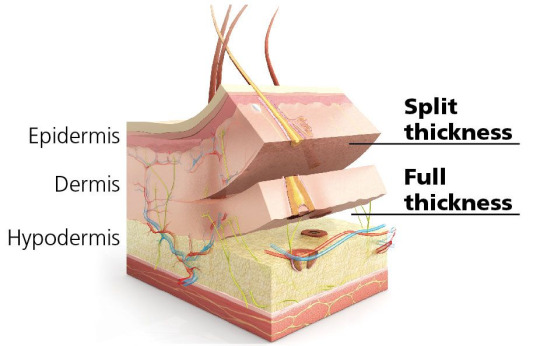
3. Composite Skin Grafts are usually small and include a combination of skin and underlying tissues, such as fat, cartilage, or muscle. These grafts are used to reconstruct areas where multiple tissue types are needed to restore both form and function, such as the nose, ears, or fingertips. - Composite skin grafts which combine allogeneic dermis and an expanded autologous epidermis can effect rapid wound closure.
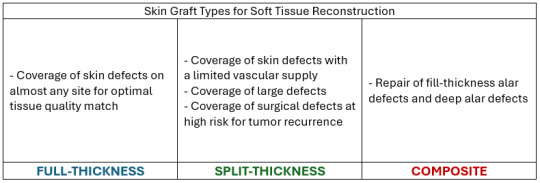
It is further broken down by the following:
Permanent Skin Grafts
1. Autografts (autologous graft): skin collected from the patient 2. Isograft (syngeneic graft): skin collected from a genetically identical donor (twin)
Temporary Skin Grafts
1. Allocrafts (heterologous graft): skin from a cadaver (living donors are possible) 2. Xenograft (heterograft): skin from another species
Can be Temporary OR Permanent
1. Synthetic skin substitutes: use of manufactured skin - The only technique that is permanent is cultured epithelial autograft (CEA), which is essentially a skin graft grown from a patient's own skin cells.
NO NON-SELF TISSUE IS GUARANTEED TO COMPLETELY AVOID DEATH OR REJECTION.
Transplant Rejection: a patients immune system identifies the graft as a foreign body, which triggers an immune response to get "rid" of the tissue.
Skin implant compatibility is based on three highly polymorphic MHC genes (HLA-A, HLA-B, and HLA-C) that encode proteins and are a part of the Human Leukocyte Antigen (HLA) system. This system identifies foreign bodies.
Knowing this, the use of modified donor animals, such as pigs, to provide transplantable organs, is gaining some renewed research. It involves excising the genes in the pig that are most responsible for the rejection reaction after transplantation. However, finding these genes and effectively removing them is a challenge.
The use of autologous skin grafts is the most common approach in the treatment of chronic wounds. However, in the case of deep and/or large wounds or with extensive severe burns, the use of autografts is limited, and either allogeneic (from cadaver) or xenogeneic skin grafts are used for transplantation.
The use of allogenic/xenogenic tissue carries a high risk of graft rejection, limiting their clinical applications.
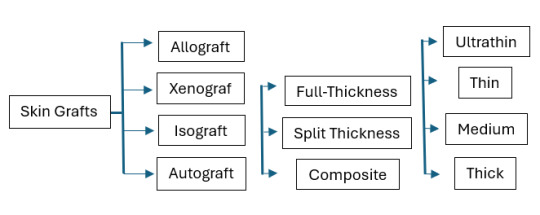
Tissue Engineering
Advanced therapies for chronic wounds involve application of bioengineered artificial skin substitutes to overcome graft rejection as well as topical delivery of mesenchymal stem cells to reduce inflammation and accelerate the healing process.
Photo shows potentially ideal artificial skin graft:

Modern treatment includes skin tissue engineering aiming to produce bioengineered biomaterial-based artificial skin grafts. Therefore, the main roles of bioengineered skin grafts is to supply oxygen (by being oxygen permeable), keep the wound from dehydration, promote healing, and prevent infections. - Depending on the type of biomaterial used for the production of artificial skin grafts, they may function as skin equivalents providing temporary wound covers or permanent skin substitutes. - When the biomaterials are pre-seeded or have cells incorporated within their matrix, they are classified as cellular artificial skin grafts, whereas biomaterials without or deprived of cells are defined as acellular artificial skin grafts.
Here are some current commercially available synthetic skin grafts I found applicable to Curly's injuries:
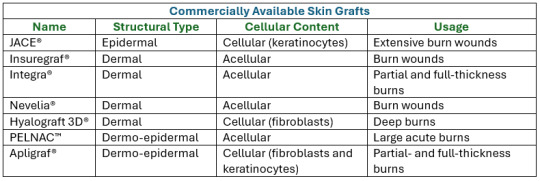
Definitions for Clarity: 1. Epidermal: Pertaining to the outermost layer of the skin. 2. Cellular Content: the complex structures and biomolecules that make up cells, the smallest units of life. 3. Acellular: not consisting of, divided into, or containing cells. 4. Fibroblasts: a cell in connective tissue which produces collagen and other fibers. 5. Keratinocytes: an epidermal cell which produces keratin (a fibrous protein forming the main structural constituent of hair).
Articles to Reference
Organ Transplantation and Rejection by Libretexts biology. LINK
(CW: Images) Skin Grafting by Joseph Prohaska and Christopher Cook. LINK
A Concise Review on Tissue Engineered Artificial Skin Grafts for Chronic Wound Treatment: Can We Reconstruct Functional Skin Tissue In Vitro? by Agata Przekora LINK
Composite skin graft: frozen dermal allografts support the engraftment and expansion of autologous epidermis by E L Heck, P R Bergstresser, C R Baxter LINK
#curly mouthwashing#mouthwashing#mouthwashing theories#leo vomits medical jargon#i didnt proof read this if there are errors you dont see them
26 notes
·
View notes
Text
Life hack: belance in yourself

Hormones are powerful chemical messengers produced by glands in the endocrine system. They travel through the bloodstream, regulating various bodily functions such as growth, metabolism, reproduction, and mood. Hormones play a significant role in maintaining balance in the body, known as homeostasis, and any imbalance can affect your mental and physical well-being.
How Hormones Work
Production: Hormones are secreted by glands like the thyroid, adrenal glands, pancreas, and ovaries/testes.
Transport: Once produced, hormones travel through the bloodstream to target cells or organs.
Receptors: Hormones bind to specific receptors on cells, triggering a response. This can involve altering cell activity, gene expression, or initiating a cascade of processes.
Feedback Mechanism: The body monitors hormone levels using feedback loops. For example, if a hormone level is too high or low, the body adjusts production to maintain balance.
Key Hormones and Their Functions
Cortisol: Stress hormone; regulates metabolism, immune response, and energy.
Serotonin and Dopamine: Mood and happiness regulators; linked to emotional well-being.
Insulin: Manages blood sugar levels.
Estrogen and Testosterone: Sexual health, energy, and bone strength.
Thyroid Hormones: Control metabolism and energy levels.
Melatonin: Regulates sleep-wake cycles.
Adrenaline (Epinephrine): Prepares the body for fight or flight.

How to Support Hormonal Health
To feel better mentally and physically, it’s essential to maintain hormonal balance. Here are strategies to care for your hormones:
1. Nutrition
Balanced Diet: Eat whole, unprocessed foods rich in nutrients.
Healthy Fats: Avocados, nuts, seeds, and omega-3s (from fish) support hormone production.
Complex Carbs: Whole grains and vegetables regulate insulin levels.
Protein: Essential for hormone production; include lean meats, beans, and tofu.
Avoid Excess Sugar and Refined Carbs: These can cause insulin spikes and crashes.
Hydration: Proper hydration supports cellular communication and detoxification.
2. Sleep
7-9 Hours of Quality Sleep: Hormone regulation (like melatonin and growth hormone) occurs during deep sleep.
Consistency: Go to bed and wake up at the same time daily.
Limit Screen Time Before Bed: Blue light can suppress melatonin.
3. Stress Management
Mindfulness Practices: Meditation, yoga, and deep breathing reduce cortisol levels.
Physical Activity: Exercise releases endorphins, improving mood and balancing stress hormones.
Journaling or Therapy: Helps process emotions, reducing chronic stress.
4. Exercise
Moderation: Both too much and too little exercise can disrupt hormones. Aim for 30 minutes of moderate activity most days.
Strength Training: Boosts testosterone and growth hormone.
Cardio: Supports circulation and reduces stress.
5. Avoid Endocrine Disruptors
Limit Toxins: Avoid products with BPA, phthalates, and parabens (found in plastics and cosmetics).
Clean Water: Use filtered water to avoid contaminants.
Organic Foods: Reduce pesticide exposure, which can disrupt hormones.
6. Maintain a Healthy Weight
Excess body fat can increase estrogen levels, while too little fat can disrupt reproductive hormones.
7. Regular Medical Check-Ups
Hormone Testing: Regular blood tests can identify imbalances early.
Thyroid and Reproductive Health: Monitor specific hormones like TSH, estrogen, and testosterone as needed.
8. Natural Supplements (Consult a Professional First)
Vitamin D: Supports mood and immune function.
Magnesium: Regulates stress and supports sleep.
Adaptogens: Herbs like ashwagandha and maca root can balance stress hormones.
Omega-3 Fatty Acids: Reduce inflammation and support brain health.
Signs of Hormonal Imbalance
If you're experiencing persistent symptoms, consider consulting a healthcare provider:
Fatigue
Mood swings or anxiety
Unexplained weight changes
Irregular periods
Sleep disturbances
Low libido

Conclusion
Hormonal health is essential for overall well-being. By prioritizing proper nutrition, stress management, exercise, and regular medical care, you can support your endocrine system and feel better both mentally and physically.
#manifestation#manifesting#shifting methods#loa methods#manifestation method#manifesation#spiritual development#journal#explain the method#explained#hormones#hormonalhealth#hormonalbalance#hormonal changes#knowledge#did you know#life hacks#life suggestions#emotions#kindness#mistakes#peace#understanding#life tips#adulting#life advice#advice
27 notes
·
View notes
Note
I went diabetic earlier this year, since then I've had far more serious health concerns to really focus on it. I've listened to my primary care and reduced my average a1c from 13 to 7. I've recently been looking into diets and what not that are the best. Currently, I'm trying to cut out all carbs, on my doctor's orders. What I'm seeing though is that a plant based diet is best. It looks like a ketogenic diet is what my doctor wants me to follow? I've watched videos on both diets and I don't know, I agree with you that keto is evil. What are your thoughts about this?
I am not a medical professional so i can't give you medical advice, but I'd say that you should ask your doctor for a referral to a dietician (an RD or an RDN, NOT a "nutritionist" - RD/RDN are protected terms that mean they have completed specific training and have specific board certification) and ask the dietician for advice on your specific dietary needs for your specific medical conditions.
What I can say is that trying to cut all carbs is pretty dangerous - not only is it a macronutrient that our body uses as the most available fuel for your body processes (we *can* get fuel from protein and fat, and ketones can *theoretically* replace sugars for energy but nobody is actually sure how long our bodies can do that and we know it's a LOT less efficient, it's supposed to be less efficient, and what that means is it makes a lot of people feel exhausted when they try it because they literally have less available energy) but also there are certain nutrients that are fortified in the US that are going to be hard to get if you're cutting carbs completely. The example that I always use is folate, because when I had to cut wheat out of my diet (i have grain allergies and celiac disease) I didn't know to supplement it and ended up with a form of anemia and stuff like "fainting" and "dizziness" and "low oxygen saturation."
Which is part of why massive diet changes should be undertaken with the assistance of a dietician! That's why I started studying nutrition! Because nobody supervised my medically necessary diet changes and it went very poorly!
Your GP very likely doesn't have a ton of training on nutrition, and is even less likely to have training on nutrition specific to your condition. If your GP is telling you to cut all carbs, they are telling you to do something dangerous and not nutritionally sound (even really restrictive keto diets call for 20g of carbs a day). Ask either them or your endocrinologist for a referral to a dietician (again, you are looking for a Registered Dietician or a Registered Dietician Nutritionist, RD or RDN, NOT just 'nutritionist') who is familiar with helping diabetics manage their nutrition.
Now, all of that said, in the choice between two fairly restrictive diets I will always say to try the one that requires less effort. It is much easier to eat a plant-based diet long term than a keto diet, and it is vanishingly unlikely that you are going to end up protein deficient (the primary concern for most people who are starting plant based diets, and it's just not all that likely - we need a lot less protein than a lot of people seem to think; though if you're going completely vegan you do need to be careful to supplement your B vitamins and to ensure that you're getting plenty of omega fats)
Because the thing is, for a diet to "work" you have to be on that diet forever. If you stop being on that diet, and stop adhering to its restrictions, whatever benefits exist for that diet go away. So the best diet for *anybody* is one that will provide them with the nutrients they need in a way that they can access regularly and affordably, that they enjoy eating and can comfortably maintain for long periods of time, and that includes a variety of fruits and vegetables because the only diet advice that is nearly universally applicable is that people should be eating more fruits and vegetables and they should be eating a wider variety of them.
I am not a fan of "diets" as a concept and I think that people should think of nutrition in terms of "my diet" not "the diet that is meant to be one-size-fits-all for millions of people that I am attempting." Your diet is what you eat and drink, and that is what you should be looking at adjusting. If you want to reduce carbs in your diet it's better to tweak your consumption than it is totally replace your diet with a one size fits all keto diet. If you want to increase fat in your diet it is better to tweak your consumption than it is to replace your diet with a one size fits all atkins diet. If you want to go plant based I think it is better to start by adjusting your diet to include more plants and to slowly replace animal based products than by trying a one size fits all vegan diet right out of the gate. You can always (and should!) make adjustments to what you eat as circumstances change and you may end up at a vegan diet or a low carb high fat diet and find that that works for you, but part of the reason that I think nutrition studies on diets are so screwy and hard to pin down is because your body is going to *flip the fuck out* when you change from, say, an average american diet to a study-provided Mediterranean diet for a 12 week experiment. If you drastically change your diet all at once and get good results immediately it's very hard to say if those results will be lasting because your body may just adjust to the "new normal" of your diet six months down the line.
But like seriously if your GP is telling you to cut all carbs you need to see a person who specializes in nutrition, and to prepare for your appointment with that person you should make a list of your goals (for you it sounds like you want to manage your blood sugar levels, reduce a1c, and *ask about* low carbs if that is something that interests you), a list of things you think that you'll have trouble with or that you want to include in your diet because they're important to you (if you really like nuts but have to be on a low fat diet, ask if there's a way to work around that with your needs, for example; if there is a cultural staple that you will find difficult to cut from family meals, TELL THEM THAT), a list of questions that you have about different types of diets, and *VERY IMPORTANTLY* information about your food budget and cooking skills. Be clear about it if you can't cook. Be clear about it if you can't afford certain ingredients.
Anyway. Once again, not medical advice, please speak to a medical professional, good luck.
194 notes
·
View notes
Text
new rules for myself <3 kind of messed up today but at least i didn’t binge. so here are my new summer guidelines, hopefully having them written down will keep me in check and i can obtain my summer body soon. maybe ill have it in time for fall… lol!
1. no more drinking / smoking unless it’s social (and i won’t pig out on food), or i’m getting high *at night* with no food around me to binge on and with intentions— like taking a nap, watching a movie, listening to music, or dancing/ working out. no smoking just to smoke because that only leads to binges.
2. at least 64 oz of water a day (2 water bottle refills). i know this is still not enough water lol but i struggle staying hydrated and this is a lot more than my usual intake!
3. either 10k steps a day OR 30min-1 hour of walking on my stair stepper or using my weighted hula hoop. no exceptions!!! need to stop being so sedentary.
4. 500-1000 cals a day. only exceptions are metab days. no more than once a week, if that!
5. less salt, fat, sugar. focus more on whole foods (fruits, veg, nuts, eggs) and when eating indulgent foods like hamburgers, fries, chicken tenders, desserts, chips, pasta etc, only have a few bites—- don’t finish food, especially once i’m already full. i really struggle with that lol. (i’m going to be on vacation soon and it’s going to be hard to avoid eating out but im going to try limiting it to 1x a day, burning cals with more activity than usual, and small portions. also stop getting sides with my food lol, no fries!) Also no more ice cream. I eat a lot of ice cream for someone who hates ice cream. also less animal products. cheese, eggs, meat. i don’t eat anywhere near as much protein as i should, even before i ever started restricting, so i don’t plan to cut down completely… i also eat a LOT of cheese which is also a habit that needs to stop. but if i can just focus on reducing it for now that’ll be a step in the right direction.
6. weigh self every day in the mornings, before eating and drinking but after using the bathroom. don’t skip it out of fear, i need to be aware so i can hold myself accountable. it’s so easy to break the habit when the number starts slipping because it’s horrible to see but being informed doesn’t change the reality of my weight it only keeps me from getting back on track.
7. journal and write out my plans and a checklist for every single day. ie, completing assignments, maintaining a clean room, doing all my household chores, keeping up with my skincare and exercise routines (although it’s only cardio), keeping track of any other obligations or outings.
8. skincare routine!!!! unless i’m going out or taking photos, i need to let my hair and skin breathe. no heat or makeup. moisturizer every day all over my body, firming cocoa butter to help my skin from losing all its elasticity. i also want to invest in a silk bonnet for my frizzy hair and victoria’s secret pajamas to wear around the house just to boost my mood lol. cute outfits to practice self care in never hurt anyone.
9. hair masks and eventually biotin / hair and nail pills as well to maintain my health a little better. maybe calcium supplements as well
8 notes
·
View notes
Text
Clear skin is more than just skincare: Gut Health
(A science based read)

What you eat is shown through your skin and on body. If your constantly shoving junk down your throat, junk is what will be shown on you. Essentially what you eat is what you are.
Eat bad -> bad skin
Eat good -> good skin
If your constantly breaking out and you feel icky. You need to figure out what is up with your gut health.
Research suggests many skin disorders are linked to an altered or unbalanced gut microbiome.
“When the relationship between gut microbiome and the immune system is impaired, subsequent effects can be triggered on the skin, potentially promoting the development of skin diseases.”
“13 Several dermatologic conditions, such as acne, atopic dermatitis, psoriasis, and rosacea are linked with intestinal dysbiosis. 223 Many studies have associated gastrointestinal health with skin homeostasis and allostasis, and there is evidence of a bidirectional interaction between the gut and the skin.”
Diet, drugs and other consumed substances affect skin through gut microbiome:
“Several studies have related the diversity and pathogenicity of the gut microbiome to skin disorders, which can be significantly altered by long-term dietary patterns. 43,105–107 Diet can affect the skin condition both positively and negatively through alteration of the gut microbiome, indicating that there is a relationship between the skin and the gut. 16 Not only diet, but also many synthetic and natural products consumed by humans as drugs can provide direct and indirect evidence on the connection between gut microbiome and skin.”
High and low fat diet:
“In the gut, a diet high in industrial trans-fatty acids increases the number of harmful microbes (such as Desulfovibrionaceae and Proteobacteria) while suppressing populations of advantageous microorganisms (e.g. members of Bacteroidetes, Lachnospiraceae, and Bacteroidales). 121 Refined and hydrogenated oils (e.g., soybean, sunflower, safflower, canola, corn, and vegetable oils) can cause inflammation in the gut, which then manifests on the skin.”
Industrially produced trans fat can be found in margarine, vegetable shortening, Vanaspati ghee, fried foods, and baked goods such as crackers, biscuits and pies. Baked and fried street and restaurant foods often contain industrially produced trans fat.
Prebiotics:
“133,134 Prebiotics, such as fructooligosaccharides, galactooligosaccharides, inulin, polydextrose, lactulose, sorbitol, and xylitol are a promising group of compounds that modulate the gut microbiome and can also provide skin benefits.”
“The effect of prebiotics on the skin condition is also obvious. For example, a Lactobacillus extract helps to reduce the size of acne lesions as well as inflammation by reducing skin erythema, improving skin barrier function and lowering the microbial counts on skin.”
types of prebiotics include:
Chicory root
Garlic
Onion
Dandelion greens
Apples
Bananas
Jerusalem artichoke
Asparagus
Probiotics:
“Probiotics can prevent gut colonization by pathogens and support anti-inflammatory responses by producing metabolites with anti-inflammatory properties. The most common probiotic microbes currently in use belong to the genera Bacillus, Bifidobacterium, Enterococcus, Escherichia, Lactobacillus, Saccharomyces, and Streptococcus. 143,144 Several beneficial effects of probiotic consumption have been demonstrated on many dermatological conditions, thus proving the existence of the gut-skin axis.”
Common types of probiotics include:
Lactobacillus: This is a common probiotic found in fermented foods, such as yogurt.
Bifidobacterium: This probiotic is found in some dairy products and helps with the symptoms of irritable bowel syndrome.
Saccharomyces boulardii: This is a type of yeast found in many probiotics. You can find these probiotics and more in supplements and select foods.
Yogurt
Buttermilk
Cottage cheese
Miso soup
Sauerkraut
Kefir
Kimchi
Tempeh
Protein:
“The proteins from animal-based food sources may have better effects on gut microbiota compared to plant-based food sources due to the higher protein digestibility of animal proteins and the fact that the digestion of plant proteins may be limited by the presence of antinutritional factors found in plants [67]. Animal proteins have more balanced essential amino acids than plant proteins [68,69] and are thus considered higher quality protein.”
“Dairy and meat protein intake at a recommended level increased the abundance of the genus Lactobacillus and maintained a more balanced composition of gut microbiota compared to soy protein, which is beneficial to the host [25,26,28].”
“Your body makes lots of different peptides, each of which has a different role. Scientists can also make synthetic peptides in the lab. Companies have been adding peptides to skin care products for decades.”
High protein foods:
Salmon
Chicken breast
Tuna
Red split lentils
Tofu
Greek yogurt
Fibre:
“Dietary fibre is comprised of plant-based carbohydrates that cannot be metabolised by digestive enzymes encoded in the human genome, such as amylase. Instead, fibre can only be metabolized by certain species of gut microbiota through anaerobic fermentation, with the main product of this reaction being SCFAs.”
“Dietary fibre is a carbohydrate in plant foods, such as whole grains, vegetables, fruit, and legumes, which have been dominant in human diets for millions of years. From the Paleolithic era, when the hunter-gatherers mainly ate fruit and wild grains, to the agricultural era, when crops began to be cultivated, the ancients consumed more than 100 g of various digestible and indigestible dietary fibre from plants per day [1,2].”
Fibre rich foods:
Chia seeds
Lentils
Broccoli
Avacado
Carrots
Red kidney beans
Raspberries
XOXO
#angelacademy#self improvement#that girl#glow up#beauty#skincare#gut health#digestivehealth#digestive system#digestivewellness#clear skin
22 notes
·
View notes
Text
How to Purify Your Blood Naturally: A Comprehensive Guide to Detoxification
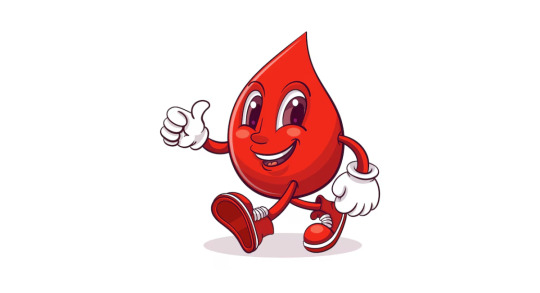
The health of our blood plays a pivotal role in our overall well-being. Blood transports essential nutrients, oxygen, and immune cells throughout the body while also carrying waste products to be eliminated. However, due to environmental toxins, poor dietary habits, and sedentary lifestyles, our blood can become burdened with impurities, impacting our health. Fortunately, nature provides several ways to help purify blood and promote overall detoxification. In this article, we will explore effective and natural methods for purifying your blood and achieving optimal health.
1. Hydration: The Foundation of Detoxification
Water is one of the most crucial elements in purifying your blood. Staying hydrated helps flush out toxins and waste products through the kidneys, supporting the blood's natural detoxification process. When your body is properly hydrated, it can more effectively filter impurities from the bloodstream.
How to do it:
Drink at least 8–10 cups of water a day, more if you're active or in a hot climate.
Add lemon or cucumber to your water for added detox benefits.
Herbal teas like dandelion or ginger tea can also aid in hydration and blood purification.
2. Eat a Blood-Purifying Diet
The food you eat directly impacts the quality of your blood. A nutrient-rich diet full of antioxidants, vitamins, and minerals helps combat free radicals, reduce inflammation, and promote the production of healthy blood cells. Focus on consuming foods that support the liver, kidneys, and circulatory system.
Blood-Purifying Foods to Include:
Leafy Greens: Spinach, kale, and other leafy greens are rich in chlorophyll, which helps cleanse the blood and support liver function.
Beets: Beets contain betalains, powerful antioxidants that assist in liver detoxification and blood purification.
Garlic: Known for its antibacterial and anti-inflammatory properties, garlic supports blood circulation and the removal of toxins.
Turmeric: Curcumin, the active compound in turmeric, is a potent anti-inflammatory and detoxifier that supports liver health.
Berries: Rich in antioxidants, berries like blueberries, raspberries, and strawberries help protect the blood from oxidative stress and improve overall blood circulation.
Foods to Avoid:
Processed Foods: These often contain harmful additives, preservatives, and unhealthy fats that can contribute to toxic buildup in the body.
Refined Sugars and Carbs: Excess sugar can lead to inflammation and imbalances in blood sugar levels, affecting blood purity.
Excessive Alcohol and Caffeine: These substances can overwork your liver and kidneys, hindering their ability to filter toxins effectively.
3. Herbal Remedies for Blood Purification
Many herbs have been used for centuries to purify the blood and promote detoxification. These herbs contain natural compounds that support liver function, improve circulation, and boost overall health.
Key Herbs for Blood Purification:
Cilantro: Known for its ability to remove heavy metals and toxins from the blood, cilantro is a powerful herb for detoxification.
Dandelion Root: This herb acts as a natural diuretic, helping to flush out toxins through the kidneys and promoting liver health.
Nettle Leaf: Nettle is an anti-inflammatory herb that supports the kidneys and improves blood circulation.
Red Clover: Often used to promote blood circulation, red clover is also known for its ability to purify the blood and cleanse the lymphatic system.
You can consume these herbs as teas, tinctures, or capsules. Always consult a healthcare provider before starting any herbal supplementation, especially if you are on medication or have health concerns.
4. Exercise: Boosting Circulation and Detoxification
Physical activity is a natural way to support blood purification. Exercise increases blood flow and promotes the elimination of toxins through sweat, boosting circulation and encouraging the release of waste products.
Benefits of Exercise for Blood Purification:
Increases circulation: This helps the blood carry nutrients and remove toxins more efficiently.
Stimulates lymphatic drainage: Exercise helps move lymphatic fluid, which aids in detoxifying the blood and removing waste products.
Improves heart health: Regular exercise strengthens the heart, which ensures better blood circulation throughout the body.
How to do it:
Engage in moderate exercise for at least 30 minutes a day, 5 days a week. Activities like walking, swimming, cycling, or yoga are great options.
Consider incorporating deep breathing exercises into your routine, which can help increase oxygen flow to the bloodstream.
5. Detoxing with Fasting and Intermittent Fasting
Fasting is a time-honored method of detoxification. Intermittent fasting, where you cycle between periods of eating and fasting, allows the body to rest and repair, promoting the elimination of toxins from the blood.
Benefits of Fasting for Blood Purification:
Promotes autophagy: This is the body's process of cleaning out damaged cells, which includes purging toxins from the bloodstream.
Improves liver function: Fasting gives the liver time to process and eliminate toxins from the blood.
Reduces inflammation: Fasting can help reduce systemic inflammation, promoting a healthier circulatory system.
If you’re new to fasting, consider starting with intermittent fasting (such as the 16/8 method) or periodic juice cleanses, and consult with a healthcare provider before making significant changes to your eating habits.
6. Reduce Exposure to Toxins
To maintain a clean and purified blood supply, it is important to minimize your exposure to harmful environmental toxins. Pollution, heavy metals, and chemicals from household products can contribute to a buildup of toxins in the bloodstream.
Tips to Reduce Toxin Exposure:
Choose organic foods: Organic produce is less likely to be contaminated with pesticides and chemicals.
Avoid plastic: Reduce the use of plastic containers, which can leach chemicals like BPA into food and drinks.
Use natural cleaning products: Opt for non-toxic cleaning agents to reduce your exposure to harmful chemicals.
7. Sleep and Stress Management
Both sleep and stress play a vital role in your body’s detoxification process. Poor sleep and chronic stress can weaken your immune system, disrupt hormone levels, and make it harder for your body to purify blood effectively.
Tips for Better Sleep and Stress Management:
Aim for 7–9 hours of quality sleep per night.
Practice stress-reducing activities such as meditation, deep breathing, or mindfulness to help lower cortisol levels, which can otherwise hinder the body’s detox efforts.
Limit screen time before bed to improve sleep quality.
Purifying your blood is essential for maintaining overall health and vitality. By incorporating healthy lifestyle practices like staying hydrated, eating a detox-friendly diet, exercising regularly, and using herbs for detoxification, you can support your body's natural cleansing processes. Additionally, reducing exposure to toxins, managing stress, and ensuring proper sleep all contribute to cleaner, healthier blood. With these holistic strategies, you can promote blood purity and achieve optimal health.
Remember, it’s always wise to consult a healthcare professional before starting any new health regimen, especially if you have existing medical conditions or are taking medications.
6 notes
·
View notes